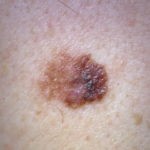All you need to know about Melanoma

What is Melanoma?
Melanoma is a type of skin cancer that develops in melanocytes – the cells that are responsible for skin-pigmentation. Melanocytes are in the epidermis (upper layer of the skin) and produce melanin, the pigment that helps protect human’s skin from UV radiation.
How to spot a melanoma?
Common traits of melanomas are the growth of new moles and pigmentation in pink blue, white, purple, red or even skin colour. It also occurs in palms, mouth, back of the body & legs.
Melanomas can develop from an existing mole or grow as new moles. Panic not, because the majority of moles are non-cancerous. Melanoma is common among people who are exposed to higher degree of the Sun’s radiation and tends to occur in the part that has little to no exposure to the radiation. If left un-noticed or un-treated, this disease will spread to other parts of the body like the lungs, liver bone or brain.
Here’s an easy term to remember to analyse Melanoma – ABCDE Signs
A – Asymmetry – If you draw two lines through a mole/pigmentation, the two halves will not match.
B – Border – The edges of the mole/pigmentation will be uneven or have a smudged appearance without a border.
C – Colour –The mole/pigmentation will be multi-coloured with speckles in shades of brown, tan, red, white, blue or black.
D – Diameter – The moles/pigmentation will be at least 6mm in diameter and sometimes start as a small dot.
E – Evolving – The size of the mole/pigmentation increases as the disease progresses and are usually 6mm in size at the early stage.
Treating Melanoma: Like other cancers, melanoma can also be treated. When detected at an early stage it can be completely cured. The treatment options available are
– Surgery
– Radiation therapy
– Adjuvant therapy
– Chemotherapy
– Immunotherapy
Although Indians have higher concentration of Melanin which means we are naturally built to fight this disease ; studies have showed that due to the change in climatic & environmental changes, the disease is posing a serious threat to Indians also. This is why we highly recommend that everyone is alert to any changes in their body, its capability and its reactions to outside factors. It is better to be safe than sorry!
References:
https://skinvision.com/en/articles/what-is-melanoma-the-complete-storyhttp://www.skincancer.org/skin-cancer-information/melanoma#panel1-1

